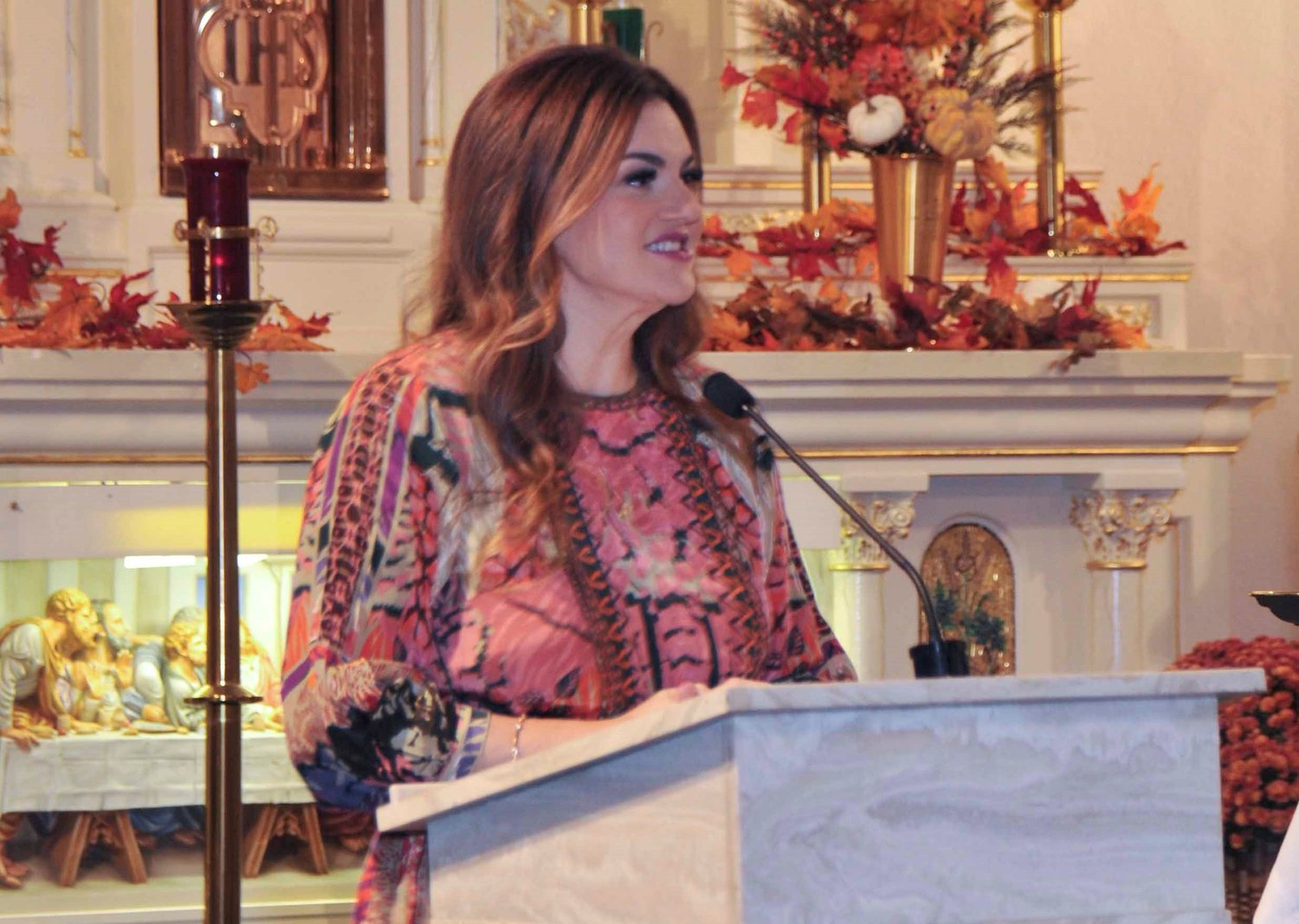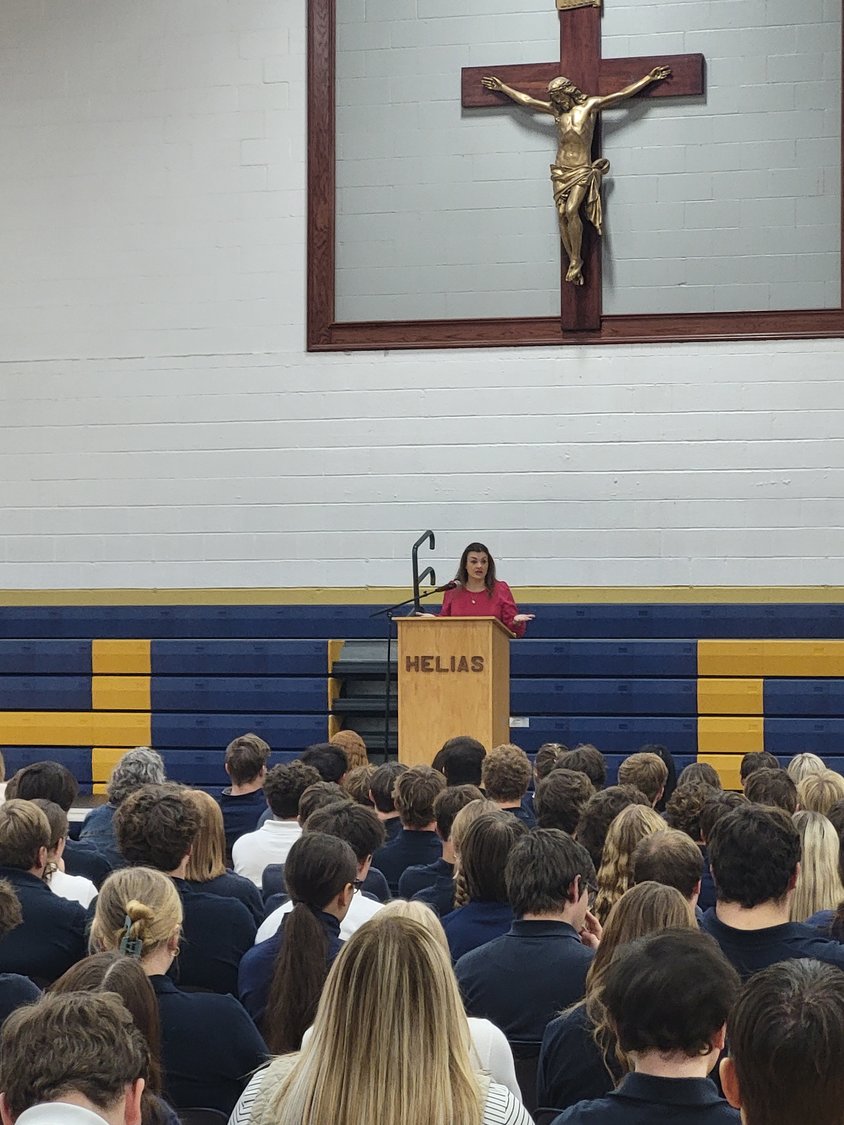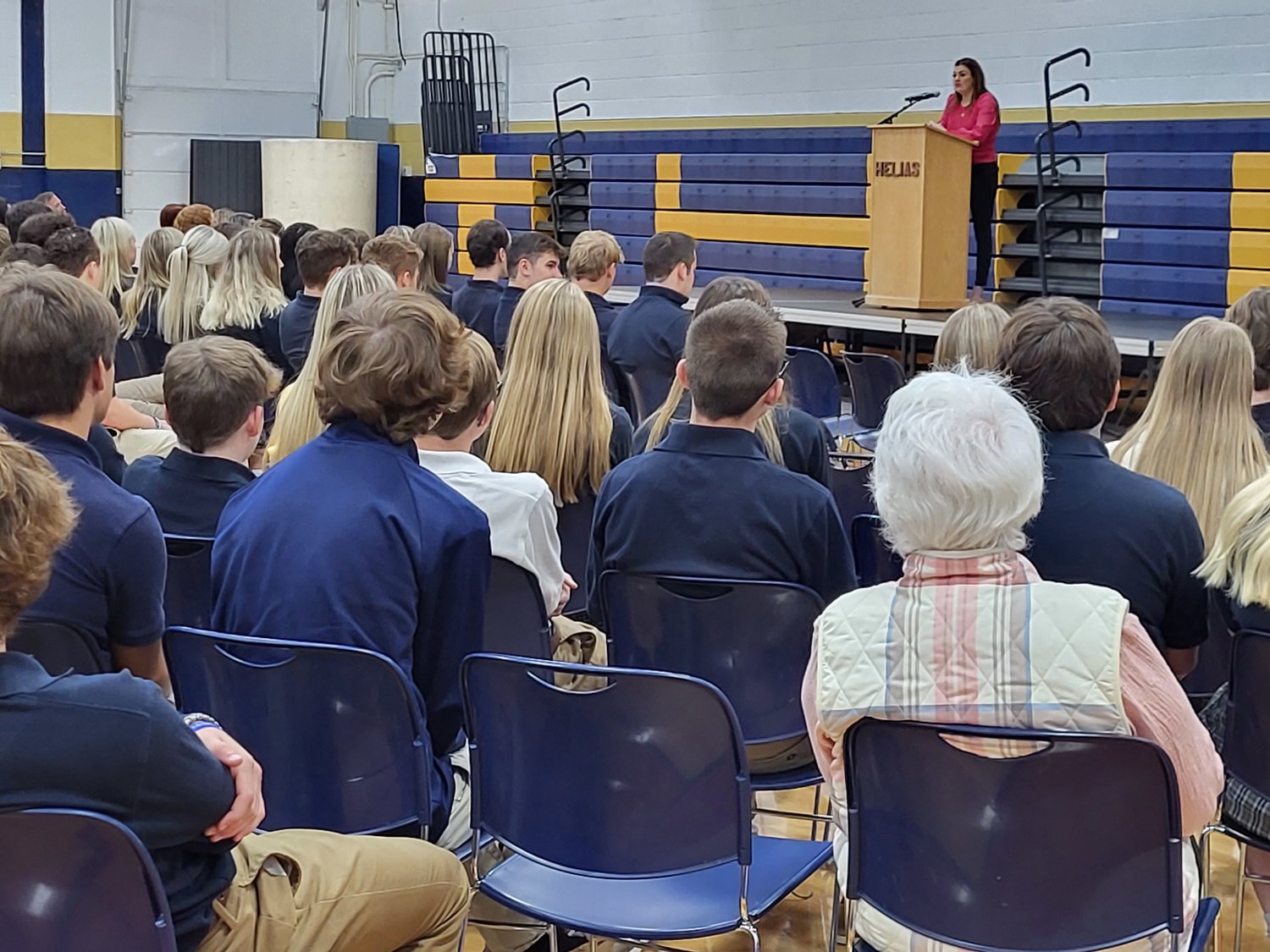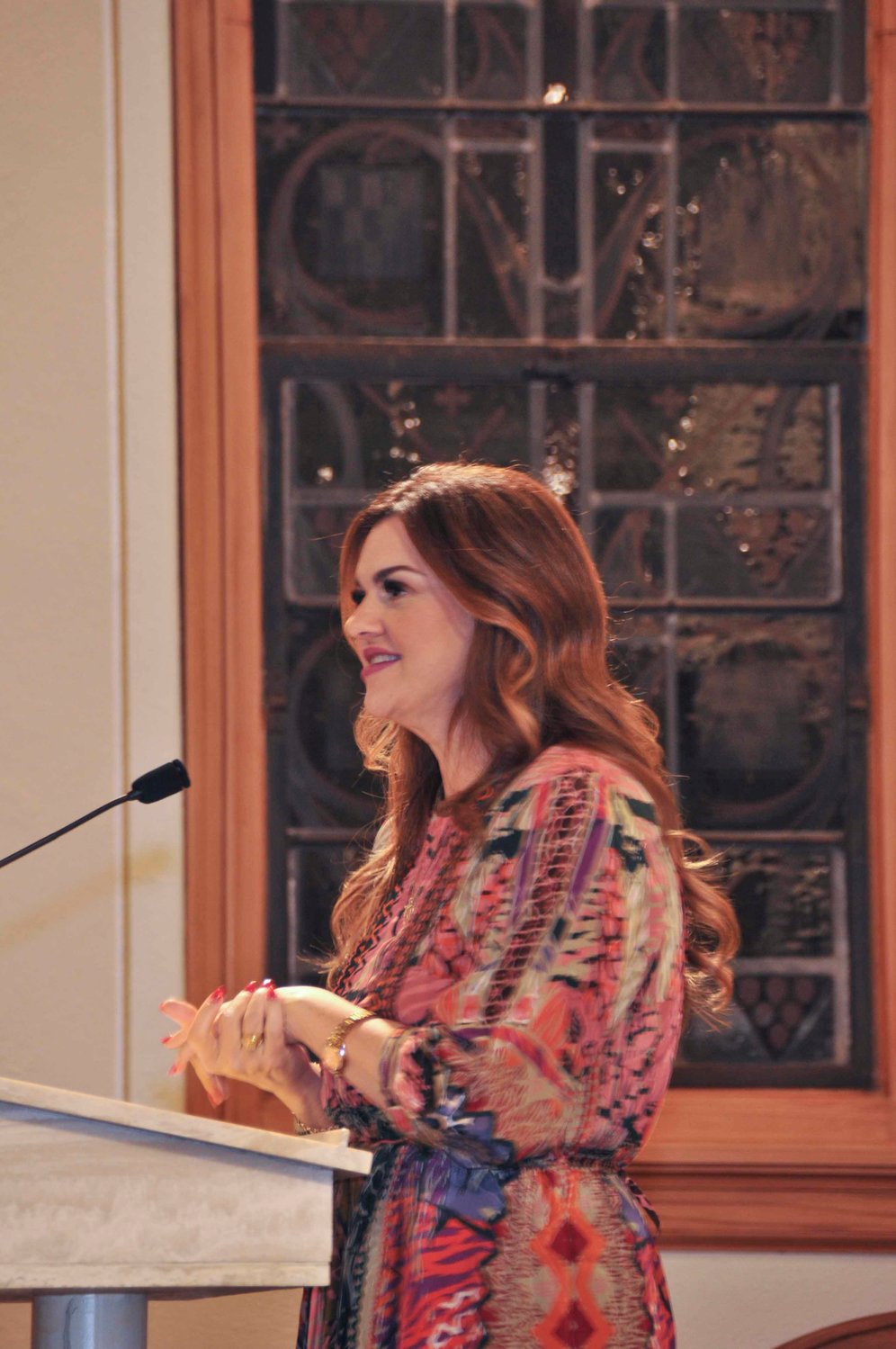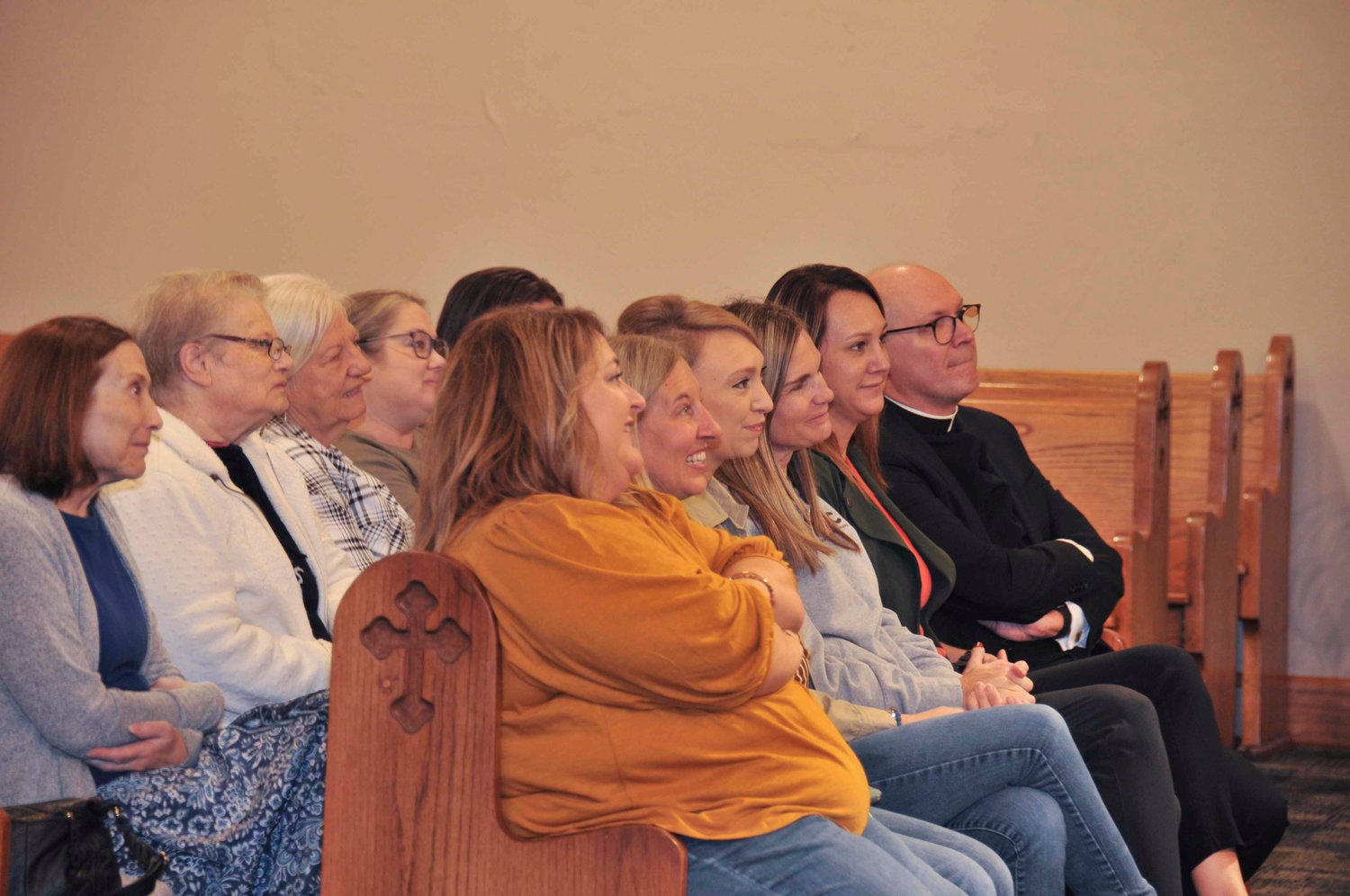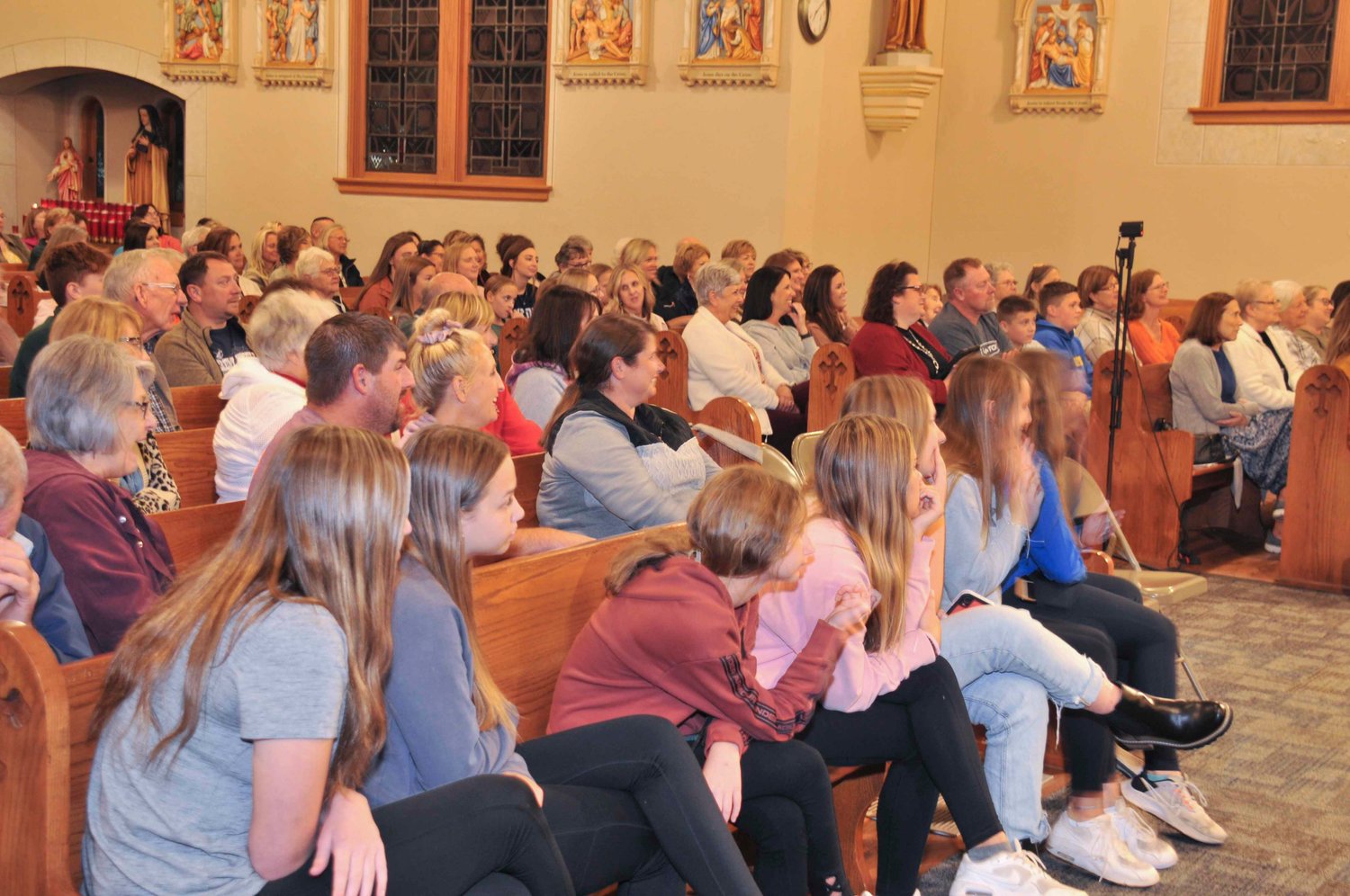Pro-life witness shares message of hope, mercy, redemption with high school students

SCROLL THE ARROWS to see more photos.
“If God can forgive me, He can forgive anybody.”
Pro-life advocate Abby Johnson spoke candidly and humbly to the students, faculty and administration of Helias Catholic High School in Jefferson City.
“I have the gift of knowing how merciful God is,” she stated during an Oct. 27 all-school assembly. “I live in the hope that God is caring for the children I’ve lost and that He will reunite me one day with them in heaven.”
Mrs. Johnson’s best-selling 2010 autobiography, Unplanned, and the 2019 motion picture based on it tell how God led her away from championing abortion rights and managing a successful Planned Parenthood abortion clinic to becoming one of the most effective pro-life advocates of her generation.
All the while, God helped her seek, accept and praise His mercy for her own two abortions.
She and her husband of 17 years now have eight children and were received into the Roman Catholic Church at Easter in 2012.
“For any of us, for any sin we’re guilty of, we don’t have to live on our past,” Mrs. Johnson told her audience.
“God wants us to live in the now!” she insisted. “The enemy lives in our past and wants us to stay there with him.
“But God wants us to wake up every day and live this gift and live this day,” she said. “We can’t change our past or any of the things we’ve done. But every day, I get to wake up and say, ‘How are You going to use my past to glorify You today?’”
Mrs. Johnson’s words commanded rapt attention as she spoke.
“God wastes nothing if we allow Him to use it,” she insisted. “You have to believe that God can and wants to forgive us and make all things new.”
Forgivable
The Vitae Foundation (vitaefoundation.org) arranged to have Mrs. Johnson speak at Helias Catholic that day and on the previous evening at Holy Family Church in Freeburg.
Standing below a large crucifix in the Helias Catholic gym, Mrs. Johnson candidly recounted her story of ongoing conversion and of being unconditionally loved and forgiven.
She grew up in a conservative Christian family in which it was understood that she would abstain from sex until marriage.
She talked about entering a relationship with a young man in college, becoming pregnant with him and mutually deciding to have an abortion rather than tell her parents.
She recounted how physically painful the abortion procedure was, but how her main reaction was relief.
“I did not think about the ramifications of what I had done,” she said.
Having gradually grown lax in her relationship with God, Mrs. Johnson set out to help women by working for Planned Parenthood, the nation’s largest abortion provider.
She shared with the Helias Catholic students her story of having a second abortion — this time at home, using a chemical abortifacient.
She experienced complications and bled for eight weeks.
Nonetheless, she was convinced that access to abortion was best for women.
In time, she became the manager of the Planned Parenthood abortion clinic in her hometown.
Seeing is believing
Mrs. Johnson gave her audience a quick overview of fetal development, including that a preborn baby’s organs and recognizable features are fully developed in the first 13 weeks of gestation in the womb.
She pointed out how science and logic indicate that a pre-born baby is a unique, individual person from the moment of conception, while Planned Parenthood maintains that life begins when the mother decides she wants the baby.
Participants in the 40 Days for Life campaign took turns praying on the sidewalk outside the clinic Mrs. Johnson was managing. Some of them knew her from school and greeted her as she came and went.
“I found them annoying,” she told her audience at Helias Catholic. “That was to say, they were persistent and effective, and that was annoying.”
The year she was honored as Planned Parenthood’s employee of the year, she was called upon to assist with a new abortion technique that involved using an ultrasound to monitor the procedure.
She recounted watching the abortion on the screen.
She told of how in that 30 seconds “the baby jumped because we were invading his space,” and of how he “began flailing his arms and legs as if he were trying to move away.”
What she saw forced her to begin reckoning with abortion and the role she had in it. She soon realized that she had to leave the abortion industry.
“What I witnessed is not justice,” she told the students. “That is NOT choice. It is certainly not healthcare. It is the intentional killing of an innocent human being.”
She and some friends went on to establish And Then There Were None, a ministry to help people leave their jobs in the abortion industry.
“Like a snowball”
Mrs. Johnson talked about how she had gone from living the traditional values of her upbringing to having two abortions and becoming complicit in carrying-out 22,000 more of them.
“It didn’t happen overnight,” she stated. “It happened a little bit at a time.”
It started with immodesty.
“Immodesty in my actions, my language, my behavior,” she said. “That immodesty led to wanting attention from guys who would give it to me — who wanted to take things from me that I should not have been willing to give them.”
The more attention she got, the more she wanted.
“It was like a snowball,” she said. “It led to bad relationships and then to pregnancy.”
She noted that her mother still grieves the death of the two grandchildren that were aborted.
New stories
As the students continued listening in silence, Mrs. Johnson turned the focus to their lives and futures.
“My life story is not the story you want,” she insisted. “You don’t want to be the one standing here in front of hundreds of people, telling your greatest sins and telling them not to do this.
“You deserve a better story than I have — a story of being loved and cherished, not of being used and made vulnerable and broken,” she said. “The story you want to be able to tell is that you always stayed on the course God has given you.”
She emphasized that it’s never too late to turn around and decide to head down a new path.
She advised all of the students to make informed decisions about where they stand on the contentious issues surrounding human life.
“You may think you’re for abortion, but I can assure you, you’re not for abortion,” she said.
She advised anyone who’s on the fence or leaning toward “choice” to actually observe an abortion being performed.
“Go watch that innocent person’s choice being taken away,” she said. “I promise you, you’re not pro-choice.”
She encouraged the students to stand up for life and confidently share their pro-life convictions after they leave the “comfortable bubble” of their Catholic high school.
“Don’t ever feel like you have to hide who you are,” she said. “Be proud of who you are.”
Becoming Catholic
Mrs. Johnson and her husband were members of a congregation whose pastor was active in promoting abortion rights.
As soon as Mrs. Johnson’s story became public, her pastor told her she was no longer welcome at that church.
Many of the couple’s newfound friends were Catholic and invited them to Mass.
Mr. and Mrs. Johnson had been raised to view the Catholic Church with suspicion, but they decided to go to one Mass out of kindness to their friends.
“While we were there, we both felt something right about it,” Mrs. Johnson recalled. “We told our friends that we kind of liked it, and before long, we were in RCIA.”
That’s when they began learning about the universal truth the Catholic Church teaches and upholds, and realized that it was right where they wanted to be.
They received Sacraments of Initiation at Easter in 2012.
Unfathomable mercy
Mrs. Johnson said she has noticed over the past decade a softening of the tone that people in the pro-life movement tend to speak with.
She believes the movement has become more open, more welcoming, more helpful to women in need of help, and “recognizing people who are broken and in need of Christ.”
She acknowledged that some in her audience might be grieving from having had an abortion or helped someone else get one.
“It’s a forgivable sin,” she told them. “It’s not a burden that God wants you to carry. He wants to remove it from you and carry it for you.”
Comments
Other items that may interest you
Services
The Catholic
Missourian
2207 W. Main St.
Jefferson City MO 65109-0914
(573) 635-9127
editor@diojeffcity.org

